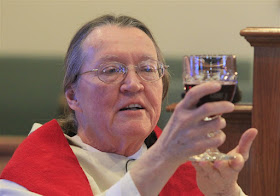Let us affirm our Sister's prophetic obedience to the Spirit in our RCWP movement to renew the Church by living the inclusive teachings of Jesus in the Gospels. Bridget Mary Meehan ARCWP
|
|
Beverly Bingle RCWP- Pentecost Homily
In the midst of a virus that is, as one of my friends puts it,
“not only dangerous, but sneaky,”
lots of people have turned to electronic substitutes
for our closed churches.
This weekend some people are going to get together physically
even though they know it’s a risk to health and life,
especially for people over 60
or with a compromised immune system.
Here at Holy Spirit, we looked at what Jesus said and did
and what our Catholic Church has practiced
at various times and under various circumstances
over 2,000 years,
and we found another way.
We continue to gather each week
by praying the Mass in our own homes,
house churches miles apart in PHYSICAL distance
but up close and personal in SPIRITUAL distance.
In doing that,
we follow the example of the earliest followers of Jesus.
They had been afraid,
but they experienced the Spirit among them,
so they celebrated Sunday evening meals in their homes
with prayer led by one of the family
and sharing the bread and wine that they blessed.
On top of that early history,
in our lifetimes we have seen a movement
in our Catholic Church
from the “pray-pay-obey” model of the Council of Trent
to the teachings of Vatican II:
that we are—each and every one of us—
responsible as priest, as prophet, and as servant leader
(John Paul II, Redemptor Hominis);
and that our “full, conscious, and active participation”
in the Mass is “to be considered before all else”
(Constitution on the Sacred Liturgy, Sacrosanctum Concilium).
_______________________________________
Jesus wasn’t one to obey rules that didn’t make sense.
He was a protester, a crusader for justice.
According to Biblical scholar Bruce Chilton,
Jesus’ own practice of table fellowship was
a protest against the Roman overlords
and the Temple authorities who were in collusion with them.
The guardians of those institutions wanted to hold on to the power
to say who was okay with God and who wasn’t,
the power to say what was okay with God and what wasn’t.
They thought that killing Jesus was the only way
to put a stop to the idea that God is in charge, not them.
So they crucified him.
And his followers denied him and ran away and hid… for a while.
Then, over a period of time after the crucifixion,
the disciples began to gather and remember
and share their memories and experiences.
_______________________________________
We celebrate today as “Pentecost”
because it’s fifty days since Passover,
when the disciples experienced
the presence of the Spirit of God
while they were celebrating
their Jewish tradition of the “feast of weeks.”
Today’s readings give us a story
of how Jesus’ disciples came out of hiding
to carry his message “to the ends of the earth.”
Luke, in the Acts of the Apostles, tells a mystic, symbolic story
of the “violent, rushing wind from heaven,”
that same breath of God that formed the earth.
John uses that same symbolism,
showing Jesus BREATHING on the disciples
giving them the Holy Spirit,
sending them, and us, as God sent him.
That breath—the Hebrew word ruah, the Greek word pneuma,
the Latin word spiritus—all mean, as Dr. John Pilch points out,
“air in motion,” “breath,” and “wind,”
and the root meaning is “power,” the power of God.
So Jesus breathes into them the ruah, the pneuma, the spiritus,
the POWER of God,
and his followers understood
that they were empowered by the spirit of God—the Holy Spirit.
That Pentecost power—the very breath of God—is in each of us,
breathed into us at birth,
acknowledged in our baptism,
confirmed in us each time we go about doing good.
_______________________________________
Back in March, about the time
that the pandemic was just reaching Ohio,
Pope Francis characterized the worldwide trauma
as "God's call on people to judge
what is most important to them
and resolve to act accordingly from now on."
We decided that life is important,
so we’ve been staying home.
We decided that our faith is important,
so we do all we can to help people who are suffering.
And we remember that Jesus told us to do what he did,
so we pray the Mass, each of us at home,
intentionally joining our prayers
with the prayers of all the others sitting at their kitchen tables
with the bread and the wine
that become for us the body and blood of Christ.
The Spirit of God is upon us!
Amen!


No comments:
Post a Comment
Note: Only a member of this blog may post a comment.